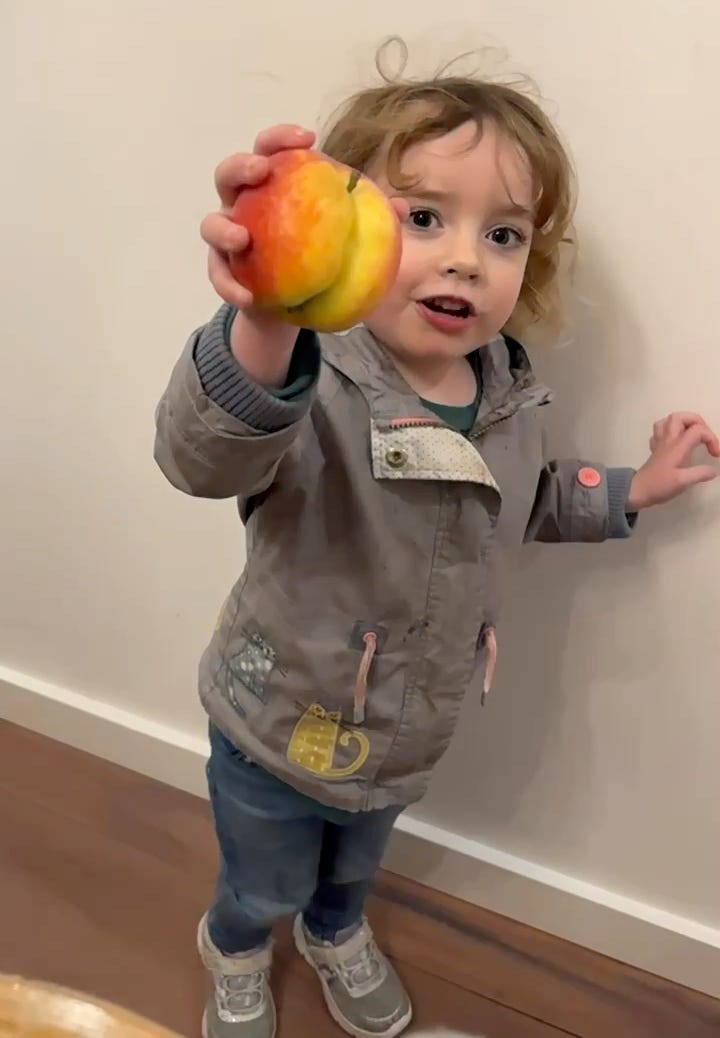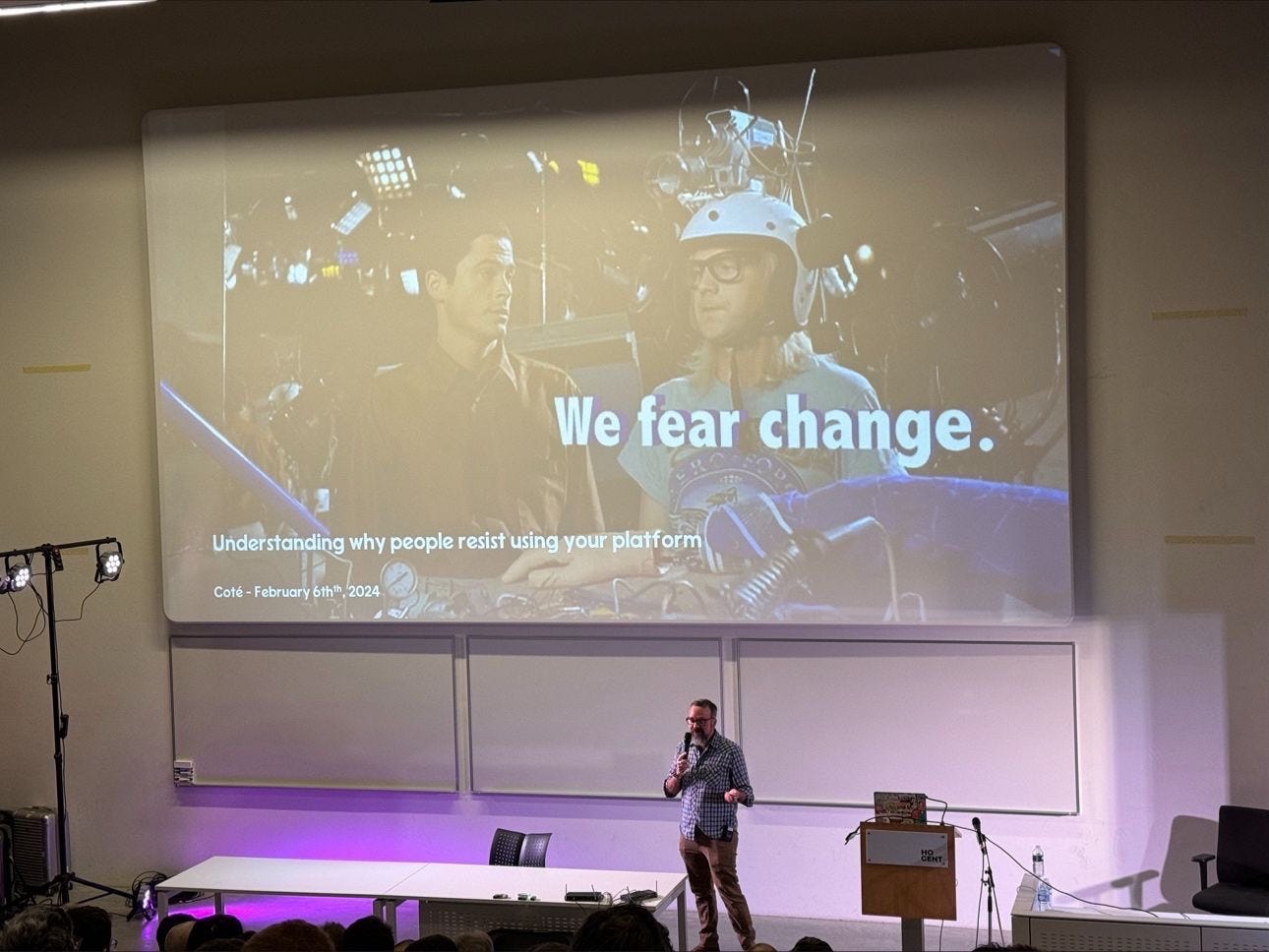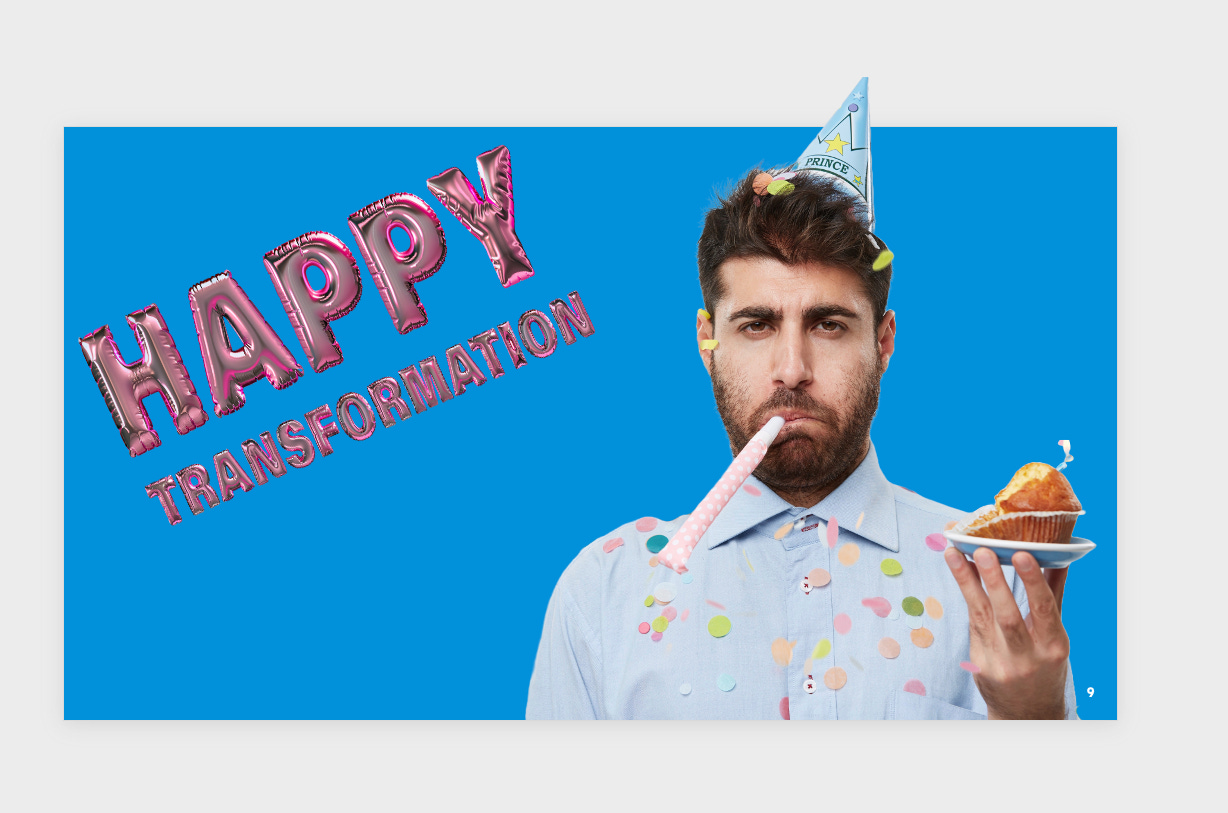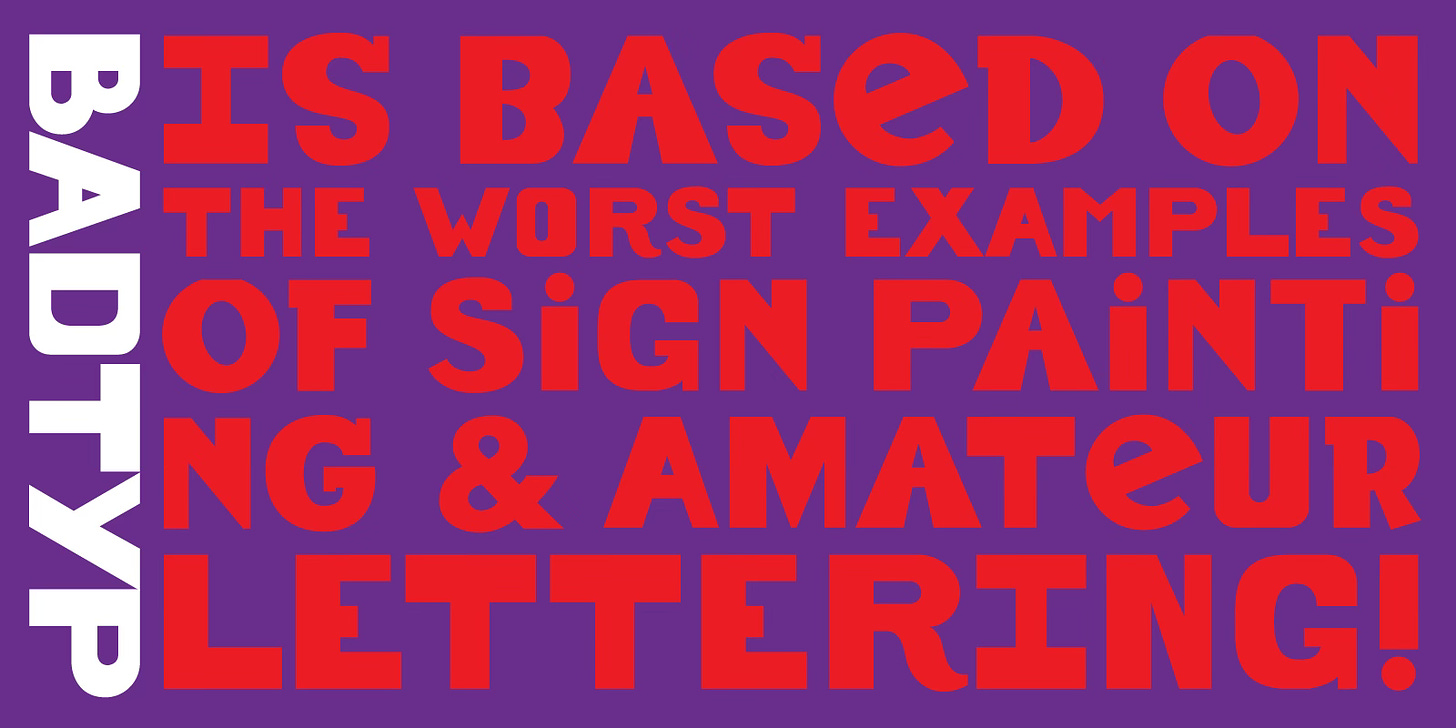Coté
I only give one talk a year, but I give it many times
Relative to your interests
Cloud without Kubernetes - Start by hiding Kubernetes, only touch it as needed. There’s enough work to do already.
Wastebook
“Unhappiness with air travel took a new turn when maggots rained down on passengers on a Delta flight from Amsterdam to Detroit, Michigan, on Tuesday.” Here.
The only reason I get away with all this shit is that I just started trying to get away with it.
I’m not procrastinating, I’m thinking.
“FUD-pedition”
“Goblins: The Unsung Heroes of Humanity’s Defense Against Sentient Toasters.” Gemini.
I don’t know anything about this topic, but I’m a professional public speaker, so I’m happy to talk about it for 45 minutes.
Speaking of Goblins
I’ve been working on a conference talk that pulls together D&D, generative AI (whatever you want to call it - can we just start saying “AIs” without having to expend the energy to roll our eyes at the nerds who correct us?), and boring ass enterprise software shit. Here is the talk I just submitted to DevOpsDays London and will start submitted elsewhere.
Are goblins the only thing holding back the AI Takeover? Benchmarking generative AI with Dungeons & Dragons
They say AIs will wreak havoc on human lives, from jobs to sapping and impurifying all of our precious bodily fluids1 to feed its insatiable need for energy. But is AI really a substitute for humans? What better way to answer that question than having the AIs play a Dungeons & Dragons dungeon master? D&D follows an intricate, yet ambiguous set of rules, requires constant creativity and unexpected imagination, empathy, and playfulness. Being a good DM requires skill at almost all the parts of being human. I’ve developed a sort of Turing test that uses a handful of D&D scenarios to test AIs: how it DMs a goblin ambush, role plays generic tavern encounters, and creates interesting open-ended adventures and world-building. More than benchmarking, this is an excellent way to learn how to create prompts, to understand what AIs are, and pretend like you’re working which you’re having fun playing games. This talk will cover my method, the results, and observations. (This talk proposal was NOT written by an AI…yet.)
//
Every time I pitch this idea to someone you can see their interest slowly light up. At first they’re like, “yeah, yeah, D&D - since I know what you’re talking about, thanks for reminding me how much of a nerd I am. I finally got mainstream society to accept me.” And then I go over it more, they’e very silent. Then they say, “holy shit!” and we talk for an hour more.
It’s not that far from playing D&D with an AI to figuring out customer service chatbots, think through brainstorming with an AI to figure out supply chain issues, or the “game” of ISO 9001 certification (you know, 9001, 9002, whatever it takes).

Conferences, Events, etc.
Talks I’m giving, places I’ll be, and other plans.
Executive dinner on Java Security, March 13th, Dallas; DevOpsDays LA, March 15th, Pasadena “We Fear Change” talk; KubeCon EU, March 19th, Paris; Tanzu (Re)defined, April 11th, Palo Alto.
If you’re going to KubeCon EU and haven’t registered yet, you can get 20% off with the code KCEU24VMWBC20.
Logoff
I struggle to get the “software is what runs your business, not some enterprise side-hustle you keep reducing the budget for” idea across, and I really like this phrasing:
digital native business often sees technology as a central part to their business strategy, not just an enabler of strategy. They don't really separate business strategy from technology strategy. They look at technology investments different.
Good toast.
Wow, everything about that clip is perfect. The lighting. The angle. The wardrobe. And most of all, the acting. That film is amazing, I need to watch it again soon.
This apple has a butt
Never use slide notes
Relative to your interests
Organize Your Change Initiative Around Purpose and Benefits - ‘An easy method of finding a change project’s purpose is to continuously ask, “Why are we doing the project?” Usually, you need to ask this question three to four times to get to the core purpose.’ // Does anyone actually have this level of clarity? When would executives have/make the time to do this work?
The Wrong Way to Use DORA Metrics - Metrics used to figure out how to fire people are a bummer.
Majority of applications will use cloud-native technologies in two years - ‘Respondents expect the majority of applications to incorporate cloud-native technologies within two years. Currently, 41% of organizations are using cloud-native techniques for more than half of their applications, but this figure is expected to rise to 61% within two years, reflecting an acceleration in the use of cloud-native application architectures. In addition, prior surveys have found cloud-native adoption to be strongest at organizations with more than $1 billion in revenue and among digital transformation leaders. This survey finds the use of cloud-native application architectures to be strong across organizations of all sizes, industries and digital maturity, confirming that cloud “nativity” is the default platform for software deployment.’
three personas of the ai ecosystem - JJ goes over three roles/people you’ll encounter in AIrel.
IDPs Give Developers More Freedom to Write Code - We’re merging the functionality of automation (usually Kubernetes automation) too much into the concept of IDPs. Automation stands on its own, and when we talk about it as just a feature of IDPs, things get too confusing. It’s tone for IDPs to be a MoM. Historically, a unified suite of ops functionality is hard to sell: people always want to swap in their own components, and the coders have to prioritize across too many different features. And now, we’d also throwing in developer collaboration sites and tools. Imagine if you combined Atlassian, CI/CD, Chef, and your entire developer tools and portal stacks into one product. It’s better that we keep these things as separate concepts that, sure, can be pre-integrated together. But automation is its own thing. I mean, do you like big suites of tools? They are always confusing and you often don’t want to switch over to using all of those pre-integrated tools.
These are really great. I feel like it’s the last thing that ever needs to be said on social media, it finishes all that “is this good/bad, etc.” talk that’s constantly going on, and also is instruction for how to be a human on social media, or in meatspace. The other project over there is fun. And, you know: man, I still love flickr even though I’ve largely abandoned it a year ago.
Wastebook
“…because we’re running a business here, not a shit-show.”
“Malibu Country Mart.”
“Ridiculous, but dry.”
Be your own best friend. Listening, supporting, validating, cheering up, accepting.
“Almost weekend!”
“Man Survives Steve Ballmer’s Flying Chair To Build ‘21st Century Linux.’” 2011.
Conferences, Events, etc.
Talks I’m giving, places I’ll be, and other plans.
Executive dinner on Java Security, March 13th, Dallas; DevOpsDays LA, March 15th, Pasadena “We Fear Change” talk; KubeCon EU, March 19th, Paris; Tanzu (Re)defined, April 11th, Palo Alto.
If you’re going to KubeCon EU and haven’t registered yet, you can get 20% off with the code KCEU24VMWBC20.
Logoff
This story is a good reminder of what “fun” looks like.
Speaking of, we found an apple that has a butt:
//
If you’re an “executive” and you’re curious what’s up with Tanzu now, we’re hosting an in-person conference in April on just that topic. It’s sort of like a multi-party EBC - if that makes sense to you, it’s something you might just like. We used my suggestion for a name: Tanzu (Re)defined.
The easiest presentation format that works
Why did Kubernetes Win the Kontainer Wars?*
John Willis finally explains why the underpowered, not fully ready, overly complex container orchestrator from Google became the cloud native juggxrnaught.
Also, there’s much whole lot more DevOps and Demming talk in the interview I did with him last week.
*Also, sure: I know that the victors never like the “war” framing. Yup.
Wastebook
“Well, we lost a lot of material things, but the great thing is, we’re all still alive, and Mom only broke one hand, and now Dad can buy a new toupee, and that will look lots better!” Bruce Sterling.
“Superior And Relentless Alignment.” Here.
“an army of fleece-clad adult toddlers” Kara Swisher.
The customer is always right, except when it comes to pricing.
Conferences, Events, etc.
Talks I’m giving, places I’ll be, and other plans.
DevOpsDays LA, March 15th, “We Fear Change” talk; KubeCon EU, March 19th. Executive dinner in Dallas, March 31st.
If you’re going to KubeCon EU and haven’t registered yet, you can get 20% of with the code KCEU24VMWBC20.
Logoff
I have some links laying around here somewhere, but I seem to have misplaced them.
////
I could totally do this, except it’d be PowerPoints instead of music…? I guess I’d need some music in the background, sure.
Also, if I shoot the video in my entire house, does that mean I can write off my entire house as my home office?
ChatGPT can't take over the world until it can play D&D
What I’m doing here is trying to figure out some benchmarking tests to rate all the AI systems out there. The “application” I’m using is Dungeons & Dragons, in particular, having it be a Dungeon Master. Today, I tested out one of the more difficult parts of D&D, combat. There’s a stack of rules, and then crossed with different monsters, player abilities, terrain, etc., there’s a ton of combinations and possibilities.
In the video today, I wanted to test out how it handles combat. I used a road ambush scenario (perhaps the most popular scenario in D&D) from The Lost Mines of Phandelver to test out the ChatDM.
It went really well, actually!
I’ll do another ~5 minute post-game analysis of what I learned and next steps soon. In the meantime:
ChatGPT 4 has improved a lot at combat since I tried it last. I think its ability to write and run code helps. It also can track hit points and ongoing status of the players and monsters.
It was pretty impressive at remembering the spatial nature of things: where the goblins were, my players, and what that meant for attacks.
There’s some minor, but important tuning to do. For example, if the players are walking into an ambush, don’t tell them they’re walking into an ambush.
It wasn’t great at interesting and clever tactics. But with some coaching it did what you’d expect goblins to do.
Anyhow: I think it was very instructive.
I think there’s at least two more scenarios I want to add to this “test suite”:
Role playing of some sort - maybe a meeting in a tavern where you have to learn some information. Maybe just getting past some guards at a gate, parlaying with some hobgoblins.
Open-ended exploring - you walk into a village and explore it, resulting in something. There’s a lot of adventures that work this way. The Village of Hommlet in The Temple of Elemental Evil is a good example of this, or just loading up, like, the Boulder’s gate or Waterdeep overview and seeing what happens when the character scurries about.
Logoff
That’s all for today.
Well, a little bit more.
I talked with my old pal John Willis about this project today. He’s been going bonkers with AI so he had a lot of feedback and questions. According to John, what I need is something called a “vector database” and a “rag.” I’ll see if we have any of the second in the wash.
A ChatGPT prompt for solo roleplaying Dungeons & Dragons
Here’s an overview of the prompt I’m currently using to play D&D with ChatGPT:
In my mind, I’ve got as new talk that evaluates several of the AIs out there based on how well they can play Dungeons and Dragons. After using ChatGPT for about a year, I have first hand experience that makes all the hype - good and negative - seems a lot less amazing. ChatGPT is practical, it’s quick, fun, and even creative. But, it’s not perfect at being a D&D dungeon master right out of the box. It takes a lot of work, adapting, and work on the player’s part. This feels like a good test case to learn and experiment with what exactly all this AI stuff can do in all domains, business or fun.
While it’s a game, Dungeons and Dragons has extensive rules, almost endless lore and commentary on the Internet, and an open ended nature that means you can do anything. To work well, it requires strict adherence to a lengthy set of rules, but a lot of judgement in how they’re applied and interpreted. And, at the same time success at Dungeons and Dragons requires a lot imagination, creativity, and, well, making shit up.
That’s just like business strategy, marketing, product development, maybe therapy, law, and most things that are high-value activities. I mean, what do us humans do except try to predict what is going to happen next and predict what should happen next, or, predict what we want to happen next?
Put another way, I think if I can get ChatGPT to play a dungeon master well, I can probably get it to do other human-creative things well.
Furthermore, there’s a lot of these generative AI things out there. How would you rate them? Usually you take the same problem/task, come up with some criteria for grading the thing’s performance, and then run that test across all the options. That’s the second part that I want to do: come up with a way of rating and judging the performance of each AI setup. In this case, when it comes to being a dungeon master.
If I come up with a few criteria and test cases (like, an adventure to play on each), I can evaluate ChatGPT versus Bard versus a Tanzu OSS stack versus Bing/CoPilot versus Claude (whenever it’s available in the EU) versus Watsonx, etc. & what have you.
We’ll see! This could also just be an elaborate excuse to play D&D instead of organizing my desk drawers.
The, uh, “analysis” of my prompt above is based on a session I did live today which you can also watch if you’re into seeing it all happen step by step. It ends right as combat starts with some goblins, which I’ll have to pick-up next time. In that livestream recording, you can see the tool-chain and technique I use for solo playing with ChatGPT, along with some commentary on the project.
If you want to check out the prompt more, it’s in the description of the video.
My Content
Write the letters - Software Defined Talk #452: This week, we examine the balancing act CEOs face between maintaining operations and pursuing growth, the IRS's attempt to automate tax filing, and defining success in thought leadership.
Relevant to your interests
Return to Office mandates boost company profits? Nope - More studies.
To CEOs and VCs Suggesting Tech-Staffing Cuts - He’s not in favor of the app architectures of the past 15 years. Nor kubernetes, or Scrum.
Can Enterprise DevOps Ever Measure Up? - A check-in on developer productivity and DevOps metrics.
Gartner Survey Finds Sales Analytics Has Less Influence on Sales Performance Than What Leadership Expected - “Eighty-four percent of sales leaders agreed that sales analytics has had less influence on sales performance than what leadership expected.”
GitHub Copilot Research Finds “Downward Pressure on Code Quality” - The AI generates too much code and does not favor code re-use.
AI Design Patterns - As it says! This is from a VCs perspective, collecting together the patterns they see.
Wastebook
“He was getting his team to paint a fence.” “About ten percent of the drowned men had their flies open.” Here.
“Repatriating the partner margins.” Here.
“I wonder how long it would take to reach product-market-fit if I start with a double-sided spoon…” Derek Sivers.
“I just replied to an email from 2018.” Current year: 2024. Here.
I don't understand very much but I know a lot of things.
“I recall hearing a presentation by a GE senior executive at a conference I attended almost ten years ago. Accompanied by a surfeit of PowerPoint, the executive spoke about how GE was reinventing itself as an information technology company. Yet the talk, with its generalities, platitudes and bureaucratic and taxonomic framing, sounded like the corporate America of a bygone age. I walked away from the session convinced that the company had no future. The successful tech people were … crazier than that, more ambitious and more focused on what their companies can and cannot do well. And they don’t use PowerPoint.” Here.
“I’m a shower idiot!” Tyler Cowen.
“Dungeon Crawler Carl.”
Conferences, Events, etc.
Talks I’m giving, places I’ll be, and other plans.
DevOpsDays LA, March 15th, “We Fear Change” talk; KubeCon EU, March 19th. Executive dinner in Dallas, March 31st.
Logoff
Weird.
"14 pints of mouthwash rations per week" - alcohol in Wes Anderson movies
There is already a delightful article on all this, but… If I needed some kind of thesis or dissertation, how about the roll of alcohol in Wes Anderson movies. How is it used as a plot device, character motivation, and just overall establishing the Wes Anderson feel.
The rat in The Fantastic Mr. Fox is motivated by “cider,” it’s what made kept him going - an alcoholic. Mr. Fox makes a rash celebratory toast after, as he says, having had too much to drink already. The animals tunnels are then flushed out with a flood of Bean’s cider!
Bean is said to survive primarily on his cider, which is extra strong and custom made. We must presume he is drunk the whole time, drinking what looks like between two to three gallons of cider a day (though, perhaps his wife shares the cider so it’s slightly less). This is likely what makes him obsess over the fox and make the dumb decision at the end to keep sieging the animals out.
Despite this alcoholism, Bean retains all of his dexterity. He also has a vert Hunter Thompson look: tall, thin, and with a constant cigarette holder and drink in hand - also always with a pistol!
The beginning of The French Dispatch uses the delivery of a tray of drinks as a sort of pacing and structure. I don’t know the term, but that plate of drinks is what drags (directs? creates the path for?) the camera through the first scene.
Also in that one: in prison, Moses is slowly killing himself by drinking 14 pints of mouthwash rations per week" until he’s motivated to re-discover his art in his art class. As he says:
Well, I’ve been here 3,647 days and nights. Another 14,603 to go. I drink 14 pints of mouthwash rations per week. At that rate, I think I’m going to poison myself to death before I ever get to see the world again, which makes me feel very sad. I gotta change my program. I gotta go in a new direction. Anything I can do to keep my hands busy, I’m gonna do. Otherwise, I think maybe it’s gonna be a suicide. And that’s why I signed up for clay pottery and basket weaving. My name is Moses.
About midway through her lecture, J.K.L. Berensen, abruptly stops saying something like, “now, I’ll have my drink,” pulls out what looks like a portable martini set from under the podium, pours a drink, takes a sip, and then keeps lecturing.
What do each of the drinks say about the characters? Bill Murray’s character in The French Dispatch has a Prairie Oyster, harkening back to Kansas, but it has an actual oyster in it, something you wouldn’t actually have in Kansas (so close from the sea in the 1950s). And the actual person, Bill Murray, has a bunch of booze lore already.
And so forth!
Wastebook
There’s a lot urgency about urgency around here.
“Pre-emptive nothingburger.”
Wow! COMIN' HOT! “We don’t run blogs because blogs are not journalism. We run news analysis stories or opinion columns (which are written in the first person and demonstrate an opinion). If you do not have an opinion that can be backed up by compelling and expert knowledge, do not write in the first person.” // The number on thing they’re missing is how much - if at all! - you get paid.
I’d never argue with them. They’re way too smart.
“The concept of a fey creature is a gamer-created mishmash of virtually all folkloric creatures that don’t eat humans, aren’t of godlike power, aren’t significantly larger than humans, are corporeal, and are basically of a human body type.” Tome of Adventure Design.
“The kingdom of Wessex was now a swamp and, for a few days, it possessed a king, a bishop, four priests, two soldiers, the king’s pregnant wife, two nurses, a whore, two children, one of whom was sick, and Iseult." The Pale Horseman.
“We do not 'leverage” anything." Google diction directives.
“unlocked efficiency gains.” They found that lost key.
“This floor has been taken over by sentient water coolers that stab people with their water dispenser faucets - which are now fanged - to suck their blood.” Here.
Relative to your interests
Only two today. If you want more links you should be subscribing to and reading Seroter’s daily reading list. I look forward to it each day…and often steal links from him!
Apple Card Users Earned More Than $1 Billion in Daily Cash Last Year - I don’t really use my Apple Card, but I like the savings account. They should setup an auto savings option that buys into an S&P index, or those age-driven Vanguard accounts. That’d be #DefaultsLifestyle FTW.
Handwriting beats typing for turbocharging your noggin - The sample size was only “36 university students,” but they did scan their brain.
Logoff
I haven’t “released” this video yet, so here, dear readers, you can get a sneak peak:
Sorry about the coffee mustache. It’s one of those things that happens as you get older.
I’ve been filming and putting up more tiny videos (and a few for work). Predictably, the how to have more fun with solo Dungeons and Dragons one is doing well.
I’m starting to like this short video format. It’s kind of like Tweeting used to be. 60 seconds is just for YouTube. Thanks to how quick I can edit with Descript, I’ve been making two versions: a 60 second or less one for YouTube, and as long as it should be for LinkedIn, TikTok, and Instagram.
Getting Buck-Wild in PowerPoint
“They say all foxes are slightly allergic to linoleum, but it's cool to the paw, try it.”
Enshittification considerificated
This week’s Software Defined Talk, episode 451: How does anyone use the Internet? This week, we discuss what “enshittification” is, what causes it, and whether it can be prevented. Plus, stay tuned until the end to hear the Software Defined Talk origin story. (Sadly, we made no 451 Research references.)
Relative to your interests
Enterprise developers: what they do, where, and how - Highlights for a recent survey of developer types.
Container Networking: From DIY to Buy - People don’t cover Kubernetes networking, they say. And it’s yet another hassle: “the networking burden falls on DevOps teams who have not traditionally been (and should not be) responsible for network deployment and management. To do so, they need to learn about Layers 3 to 7, border gateway protocol (BGP), subnetting, network address translation (NAT), and the like, but that’s a fairly long training path.”
Everything’s a Dungeon: A Different Approach to Exploration Design - How to think about the “node-paths” of an adventure, in a dungeon-crawl, city, etc.
Wastebook
“I was trying to play a simple fantasy rogue adventure, but the AI is obsessed with half naked busty women.” Yup.
“1 hour of flying toasters.” Here. (I feel like there’s not enough toast in this one.)
Looks like we need to re-send the memo.
“Displeased unhappy bearded Caucasian man with cone hat on head and party horn in mouth looking at camera with bored dissatisfied expression as his birthday party sucks.” Here. (And, see below for said bearded Caucasian man.)
“Some research has found that asking people to simply set aside half an hour a day for worrying allows them to avoid worrying during the rest of their day.” Here. By “simply,” they mean “only.”
“Also, for the record, this woman is the woman who was thrown out of a Walmart for cleaning their bathroom, but she is NOT the woman who went and stocked shelves at a Target.” Here.
Logoff
I’ve done a lot of slide work today for my upcoming “We Fear Change” talk.
As Mark Cathcart, Distinguished Engineer at Dell and previously IBM, once said to me, shit-eating grin on his face looking up from his cubical, “I used to be good at my job. Now I’m good at PowerPoint.”
This presentation I’ve been worked on today gets buck-wild right from the start:
First, we’ll see if I actually use this. Second, what’s going on here is this. I really want to use that Wayne’s World bit.1 It’s what I named this presentation after! But, when you start a presentation you don’t just go cold into the title slide, you have to mess around with wires, wait to get the signal to start, etc. So I needed some kind of resting slide before the title slide. What better than toasters? Then, you can just put “slide zero” up - the toasters - and go into the title slide when needed, making sure you can time the, you know, joke.
Yeah.
We’ll see if I actually use it next week.
IT COULD BE TOO MUCH.
“Don’t Try” Expanded
The “p” in IDP is for portal, not platform.

I think about this headstone often. It’s a well known, eye-rolling cliché is that, of course, he meant to let art flow through you effortlessly. He was, after all, a poet.
For those of us who can’t just pour the muse out of a bottle, there’s something more to “Don’t Try.” And that is: stick to what you’re good at. If you’ve developed a skill (or, I guess, an outlook on life) make sure to do it a lot, by default even.1 You also don’t need to show off and get validation for it, just do the work. Don’t try to do more than you’re good at in day-to-day life.
Of course you should learn new things, improve, and push yourself. But not that much. If you’re always focused on how you could be better, you’ll get depressed. You know, gratitude journals about how well things are going, and how good a person you are just the way you are.
There is also the Don’t Try of getting too involved outside of your area of concerns at work.
And, there's the Don't Try that therapy is always telling me: all these things you're tormented about are actually not that bad, most are even "nothing." You are the one tormenting yourself because you're trying too hard to care, to think things matter when they don't. Instead, don't try to see what's not there, just accept what the flow of life. It's probably fine.
Anyhow. I could probably try to make this point better. But, you know…
Update your Java apps to do that FinOps magic
If you run Java apps, chances are high you run Spring. This year, you should make sure you've upgraded to the latest version: you'll get huge performance boosts like uses 70% less memory and faster boot-up times that I can't even calculate the improvement for. Check out my pal DaShaun demonstrating these improvements in this quick video.
That means saving money if you can FinOps your way into using less beefy, costly cloud doo-dads and shutting down long-running Java process because you can’t afford the VM startup-time delays. Also, many older versions will not longer have support available. Upgrading is easier than you'd think and it'll get you these free payoffs. Plus, you know, actually new functionality and happier developers.
And, if you want a free way to see if your app can get these benefits, check out our Spring Health Assessment report. It’ll look at your app and take a swing at how you can make it run rul-better-like.
Wastebook
Reading Rainbow: Business Book Edition - “Synergies in the sky! I can crow CAGR twice as I high! Take a look, it’s in a PowerPoint, Reading Rainbow!” Yes, and, who would be the host?
GUM IS TERRIBLE WHEN OUTSIDE THE MOUTH.
“It’s not something I keep a tab open for.” _Dear John Letters, Jan 18th, 2024
Well, you know what they say about “hope,” right? What? Yeah, neither do I. That’s probably why I ain’t got none.
One powerful benefit of getting older is the default stance of knowing less about pop culture and generally not caring. As an aging Gen-X’er, you can really amp this up by taping into your mutant super-power of not giving a shit about anything. If you’re getting older, and you find yourself getting upset more and more, then you’re doing it wrong, and just giving yourself the shits.
Logoff
Awhile back I mentioned that I was asked to contribute to a 2024 predictions round-up. Here’s the final article, converted to an interview style with just me.
I’m a proponent of something I call the #DefaultsLifestyle which is literally and, more broadly, metaphorically the idea that you should just use the apps that come on your iPhone instead of spending time hunting down and learning to use “better” ones.
Lessons from Uber on developer productivity & platforms
Tell me the last new condiment you tried that you didn’t like.
Developer Productivity
One of my co-workers worked at Uber for awhile on their internal developer tools and platforms. In this week’s Tanzu Talk episode, Cora and I talk to him about what they did, why, and how as well. Check out the video below, or the podcast episode if you prefer that.
Relative to your interests
Pitchfork & The Death of the critic - Death of the critic? No, as always, when the medium changes, how the job is done is changes. // “The culture critics who spent days creating words of criticism now have to evolve to use today’s tools to help others think differently, try new things, and have an influence. Playlists are the new words. Followers are the new readers. Critics of yesterday are now ‘tastemakers.’ While anyone can be a tastemaker, to be good, and have real influence, one still needs to have skills that add up to a professional critic – broad awareness of modern and past works, other aspects of life, understanding of popular culture, knowledge of society, and contemporary politics, economics, and global context.” // Socrates hated writing. His medium was talking. He feared that writing would ruin philosophy. Plato learned the new medium, and the reach was more powerful effective and durable. A 60 second video may not seem like a critical piece, but if it contains critical analysis and, even, recommendations, of course it is.
Why Agile doesn’t work for most IT pros: The bigger you are, the harder you fall - I thought they’d stopped doing the State of Agile surveys, so it’s fun to see a new one.
Bell Labs & Google: bookends of the same sad story? - “Whether it’s Bell Labs, Xerox Parc, or IBM Research Labs, the story is always the same: corporate overlords are so married to the staid predictability of their cash cows that they fail to make bold decisions. Middle managers who eventually rise to the top lack the imagination or risk-taking capabilities to put their companies on new growth curves.” // I don’t like this as a complete failure explanation. The missing piece is something more like innovation in business models: figuring out how to create a business out new products and new features, and often failing to! The comments from Google people are right, though: you need some kind of innovation and product driven leadership to keep the product going. In contrast to the usual innovate or die mindset, an appreciate for cash cows: yes, your company is “just” a cash cow with predictable, low growth revenue. That is how most businesses function and it’s perfectly fine: you just have different expectations as an investor and an employee. You are low risk, you are steady, and likely you are part of how society functions. You move slow and care for things.
Related, incremental improvement (or “drift”): “In other words, to build a great data business, today’s startups don’t have to come up with particularly novel ideas or get a bunch of bets about the market right. They just have to rebuild what’s already there, but more deliberately and on more certain ground than the original pioneers could.”
Wastebook
I have no idea what they’re doing, but they’re obviously not very good at it.
Two models of judging “value”: (1) how much value you can create, (2) how much value you can take. You can grow a forest, or you can harvest a forest. You can lower prices, or you can raise prices. You can collaborate, or you can take credit. We aspire to turn all those or’s into and’s, but we mostly do one or the other.
All process improvement can be learned by how to manage the flow of laundry and dirty dishes. And we should take the overwhelming nature of those as therapeutic council that you can never master it consistently. Especially when you have kids.
“On the other hand, the frenzy is destabilizing.” Here.
Logoff
It’s a regular hurry up and wait situation at the moment.
If you're not changing tools, you're not changing
All Talk, No Tools
I like heuristics you can use to figure out what’s “really” going on at work (well, in any system, I guess). When it comes to Big Change, one of the heuristics I like to use is to ask if the organization is using new tools.
My colleague Bryan Ross has a new post up on using this test.
For example, if you’re in some big digital transformation initiative - like migrating to cloud, converting your app dev style to cloud native, getting more agile/DevOps/platform engineering - are you using new tools? Are you at least upgrading your existing tools to get new functionality? If you’re not, there’s a good chance you’re not going to actually change. Worse, if management is avoiding changing and adding budget for new tools, you’re also likely not going to change.
Sure, this isn’t always the case, but it should make you suspicious. Tools are how you get most things done in IT; just talking doesn’t write code too well, deploy it to production, or troubleshoot it when things go wrong in production. Tools will generally embody how you work and what you do (and vice-versa). So, if the tools aren’t changing, it’s likely that how you work isn’t going to change, and, thus, the outcomes won’t change.
Check out Bryan’s post! It’s part of the series he’s been doing to write-up his version of a series of goofy videos I did last, this one in particular.1
How to walk on ice
Here is me making some kind of life-inspirational video. PROSPER!
Relative to your interests
Workers are filming their layoffs, then posting them to TikTok. What could go wrong? - Where there’s information asymmetric, there’s generally bad power-dynamics. And when The Kids hack that asymmetry, The Olds generally lose their shit.
The Class Missing from Business School - What is the best way to do this an IC? ‘1. Shifting mindset from “How do I accomplish this?” to “Who should be the right person to accomplish this task & how would it fit into their goals?”’
2 Ways to Reduce Bottlenecks with the Theory of Constraints - Things get a little confusing when he all the sudden says to finish things to the right of the bottleneck, but I think that just means to first finish all the work that has no bottleneck and can be shipped. It’s cleaning your room before getting to work. All that unfinished work is its own bottleneck, I guess. What I think is always (or just often) missing from theory of constrains, value stream thinking is (1) innovation, and, (2) controlling marketing demand (marketing and sales). I guess you could call demand a bottleneck, sure, but at some point you’re just reinventing the universe to bake an apple pie from scratch.
The Value of Open Source Software by Manuel Hoffmann, Frank Nagle, Yanuo Zhou :: SSRN - “We estimate the supply-side value of widely-used OSS is $4.15 billion, but that the demand-side value is much larger at $8.8 trillion. We find that firms would need to spend 3.5 times more on software than they currently do if OSS did not exist.”
Wastebook
In our little town, if you leave trash outside of the trash bin, you get fined. There’s a guy who comes every two or three weeks to figure out who put that trash out the: he rifled through boxes to find any that have addresses on them and takes picture of it. I presume these people get fines. That guy must have the worst job ever. No one likes what he does and thus they look at him in distain and even shame. He’s on law enforcement and would probably like to do something more impactful than trash patrol. The whole policy is absurd. Amsterdam doesn’t do this (we live in a small enclave village), and things are fine. Setting a policy that creates a job like this should tell policy makers that something is wrong with the policy.
“Indefinite hyperbolic numerals.” Here.
Improving productivity assumes one, often unstated first step: you want to get things done with less effort and cost, or just done at all. I argue that in most cases, people don’t want to get things done, or, often, they don’t want to get things done efficiently. One angle is to ask who benefits from the productivity. If it’s not the people doing the actual work (the workers), they won’t have much motivation and, likely, won’t care, and won’t want to do it. Would you put a lot of work into a project you got nothing (new) out of?
“This is not the cliff hanger any of us need right now.”
Logoff
It’s Solo D&D update time! Last time, I told you that playing solo D&D with ChatGPT was going well. I’ve found the limits of my prompting abilities, though. And, probably, ChatGPT has hit a limit too. It’s just not very creative, and it can’t run mechanics very well. It’s great at co-creating and being a sort of sounding board. But it’s bad at action. And, action is at heart of Dungeons and Dragons: if there’s no action, you’re more just writing a book.
So, I’ve been doing a lot more solo D&D in my head, and not really using ChatGPT much at all. I went a few weeks not really getting much playtime out of the time I spent on it - I’d be reading published adventures, making maps, etc., but I never seemed to get around to actually playing.
Playing a module on your own that’s intended be played by a group is weird. There’s no surprise about anything so you have to be disciplined not to cheat. I mean, this is pretty easy if you remind yourself that the point of the game is to have fun, and challenge is fun. If you cheated at solitaire, what would be the point?
This weekend, I started playing through The Final Voyage of Draengr Thar, which turned out great! That guy makes good, little adventures. This one was pretty much all action focused - there’s some room for role-playing, but most of it is just movement, investigation, and, yes, combat in caves. I did this kind of thing early on in playing solo D&D, but I kind of lost track of it…or I feel into thinking up more story-based adventures.
My theory is that there’s a few reasons why the fun slowed down for me:
I’d create an environment where there was little conflict. Everything was fine in The Elderwood. If you want action, you want conflict. So, I made up some story that there was a multi-year battle between involving devils. Then, in the aftermath, everything was still messed up with all sorts of weird and dark parts of the land left. Thus, you can get more of the “murder hobo” or Hexcrawl style play where anything can happen, where random things fit in because there is no pre-defined structure and campaign, and where there’s more conflict, thus, action.
I don’t really like dungeon crawls, but those are easy to to pack in the action. So, if you throw those in there, you have more action. I’m pretty sure you can convert “dungeons” into cities and forests and stuff as well.
That’s all I’ve got so far!
I’ve tried using several of the solo adventure oracles and systems, but I just can’t seem to get into them. I think a lot of it has to do with #1 above: I want too much control over the environment and campaign, I just need to go with randomness. I do really like this GM Apprentice tool that rolls a lot of those systems into one.
“Last year” is inaccurate. It was October, 2022! How strange the brain works that I feel like it was just this past Fall, when it was really two Falls ago.







